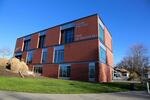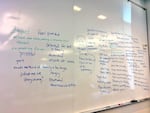
Clark College in Vancouver, Washington.
Molly Solomon / OPB
A series of flyers posted around Clark College proclaiming "It's OK To Be White" and "Make Your Ancestors Proud" prompted two town hall meetings this week.
More than 100 students, faculty, staff and community members showed up Wednesday afternoon for a two-hour discussion on the posters.
It was co-facilitated by Clark College Dean of Engagement Cat Busha and community organizer Ophelia Noble, who runs The Noble Foundation, a nonprofit that specializes in giving voice to marginalized communities in southwest Washington.
“We want to provide a space for anyone and everyone in this room to be able to share,” said Noble, who passed a roving microphone through the crowd.
“It was shocking, especially that there was more than one flyer,” said Clark College student Clayton Holmes. “This type of thing is not acceptable here at Clark.”

More than 100 students, faculty and community members attended a town hall at Clark College to discuss offensive flyers circulated on campus.
Molly Solomon / OPB
Others spoke of fear after seeing the flyers on campus, especially after some were left outside the college’s Office of Diversity and Equity.
“This is where many people of color come to feel safe,” said student intern Katelyn Claflin. “To have that message so close to their safe space makes me feel really upset.”
The Washington Post reports similar incidents are happening on campuses across the country, describing the posters as recruiting tools for white supremacist groups.
"The intent I see is to divide us. It's a way to rally those who might align with those ideas," said Tre Sandlin, an instructional accessibility technician at Clark College.
Sandlin spoke about his own whiteness and how polarizing race has become in our current political climate.
"I wear the face of an oppressor, a slave owner," Sandlin said. "I want to be aware of that and make sure I'm not carrying on that legacy. I want a better world without threats from these fringe groups."
Clark College diversity outreach manager Dolly England voiced her frustration after being confronted with the white supremacist messages outside her office.
“This is my community,” said England, who also lives within walking distance of the Vancouver community college. “Not only do I have to think about it at work, I also have to think about it in my personal life.”

A recent round of posters reading "It's OK To Be White" were posted around Clark College, a community college in Vancouver, Washington.
Molly Solomon / OPB
It’s unknown who posted the signs on campus, but the original flyers were created by the group America First Media. The group posts frequently to YouTube and describes itself as “from an American nationalist, alternative, right-wing perspective.”
Its co-founder, James Allsup, has built an online following as an emerging figure in the so-called "alt-right" movement. Allsup is the former President of Washington State University's College Republicans and was a polarizing figure at the university. He resigned in August after he attended the white supremacist rally in Charlottesville, Virginia.
Allsup did not respond to requests for comment on whether he played a role in distributing flyers near Clark College.
The town hall discussion also served as a space to share ideas and form an action plan that could help educate and inform students if the posters continue to reappear on campus.

A meeting on the flyers found near Clark College outlined community impacts and a possible action plan moving forward.
Molly Solomon / OPB
Some suggested a teach-in next school quarter, while others asked how faculty and staff can be better allies for students of color.
“We need to take this fear and anger and make it productive with some systemic changes,” said Diana Perez, the Washington state director of the League of United Latin American Citizens.
“We may get another flyer, what are we going to do?"